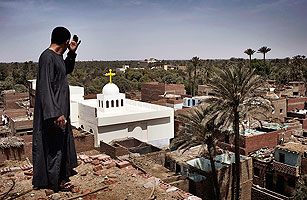
When President Obama stepped into the State Department on May 19 to deliver his long-awaited speech on the Middle East, he did so amid fears that the Arab Spring was devolving into a Summer of Discontent. Egypt was sagging under a weakening economy and escalating crime; NATO’s efforts in Libya were stuck in neutral; the Syrian government was boasting that its rebellion was over. Sectarian tensions were roiling Bahrain and Syria, and a wave of church burnings in Cairo had spawned a week of deadly violence between Muslims and Christians.
In his speech, Obama confronted these religious struggles head-on. “In a region that was the birthplace of three world religions, intolerance can lead only to suffering and stagnation,” he said. “For this season of change to succeed, Coptic Christians must have the right to worship freely in Cairo, just as Shia must never have their mosques destroyed in Bahrain.”
Beyond their political implications, the religious dimensions of the Middle East uprisings have always been central, particularly to the West. Ever since 9/11, the West and Islam have been locked in a chilly standoff. The relationship was captured by Harvard professor Samuel Huntington’s lightning-rod phrase “the Clash of Civilizations.” Huntington’s thesis, which was roundly trashed when it was published as an article in 1993 but became a best seller in book form following Sept. 11, was that Islam taught Muslims to be hostile to freedom, pluralism and individualism.
At first blush, the Arab Spring seemed to render Huntington’s idea deader than ever. In up to 20 Islamic countries, Muslims marched in the face of bullets, tanks and water cannons, demanding the exact human dignities that parades of commentators had assured the American public Muslims didn’t want. If anything, the uprisings of 2011, coupled with the death of Osama bin Laden, raised the tantalizing possibility that the West and Islam, which came to the brink of a Holy War in the past decade, might finally be able to build a Holy Peace. Could the Clash of Civilizations be giving way at last to the Convergence of Civilizations?
In recent weeks, the news from Egypt has suggested the answer is no. The downfall of the dictator Hosni Mubarak seems to have unleashed all kinds of pent-up religious hatreds. The latest explosion of violence began in the dusty Cairo slum of Imbaba on May 7. Rumors circulated that a Christian woman who had converted to Islam to marry a Muslim man had been kidnapped and was being held captive in the St. Mina Church. Muslims, many from the ultra-conservative Salafi sect, began marching on the facility. Coptic Christians, who make up about 10% of the country, hurried to defend the church. Thousands gathered, brandishing makeshift weapons and hurling insults. Street fighting broke out, and by the time the melee ended the following morning, 15 people had been killed and more than 200 wounded, and three Coptic churches were in flames.
Episodes like this one, reported around the world, fit into a narrative of extremist Muslim aggression and intolerance that has dominated American public discourse since Sept. 11. But what this story line misses is that a powerful new narrative has emerged from the Middle East in recent months that, for the first time in a generation, poses a serious threat to the fundamentalists’ appeal. And that narrative can also be told from the recent sectarian events in Egypt. It is a story of the rise of a moderate coalition and its counter-attack against extremism.
The best example of that story unfolded two hours south of Cairo in the tiny village of Sol, in Helwan governate. A place of dirt-lined streets on the border of the desert, Sol was the site of the first church burning in the days after Mubarak’s fall. Rumors played a large part in this conflict too: a Christian man had been in a romantic relationship with a Muslim woman, a domestic dispute broke out within the woman’s family over her actions, and two people were killed, including her father.
After the funerals, a crowd of Muslims went looking for the Christian man, who they heard had sought refuge in the church. When word spread that someone found evidence that black magic was being performed on Muslims inside the church, the crowd set the building ablaze. It was exactly the sort of violence Mubarak had warned about for years: Keep me in power or sectarian divisions will rip apart the country.
See how the Arab Spring could finish al-Qaeda.
See TIME’s complete coverage of “The Middle East in Revolt.”